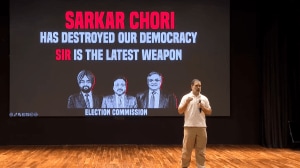Who cares about Dharmendra in Dharmapuri?
Compared to Dharmendra and Hema Malini, who allegedly converted to Islam to get married as the actor did not get a divorce from his first wi...

Compared to Dharmendra and Hema Malini, who allegedly converted to Islam to get married as the actor did not get a divorce from his first wife, Munusamy and Mathamal are lucky. Not only because in Dharmapuri no one bats an eyelid if a man marries more than once without getting a divorce, but also because Munusamy’s first wife Satyavani is happy sharing her husband.
It’s the same with Kaliappan and Senthil and their wives Selvi and Kalai. Polygamy, rather bigamy, is a rule here rather than an exception. And, whatever the fuss about Dharmendra, it does not figure as an election issue. However police officers dealing with marital disputes think the women always get a rough deal in such marriages.
Says police inspector in Harur, Chitra Devi: ‘‘I strongly object to polygamy. More so because the reasons behind this flourishing tradition are poverty and illiteracy.’’ Adds a sub-inspector in the all-woman police station in Dharmapuri town: ‘‘Although bigamy is rampant, very few cases are registered with the police. Last year, only three cases were filed in my police station.’’
Victimised by tradition, poverty and illiteracy, most women have no serious complaints against polygamy and accept it as their fate. The police and the judicial officers say that until a spouse files a case against the other, they cannot take any action. In nine cases out of 10, the second or the third marriages are solemnised as a family affair and if any problems arise, these are solved at the village level and things are hushed up.
As bigamy or polygamy are non-cognizable offences, the authorities cannot curb them legally, Chitra Devi says. But for her, polygamy implies subjugation of women. Until recently, men, in and around the area she supervises, did not know that the sex of a child is determined by their chromosomes, she says.
Due to this misconception, men considered it their privilege to expect a certain leniency from their women and the women considered it their duty to grant them that. She, along with her colleagues, are trying to build public opinion for monogamous marriages, which ensure dignity for the women.
Interestingly, she and her ilk reflect a perception that may be exclusive to women. The male officials here, including senior bureaucrats and law-keepers, are apparently apathetic towards the issue, especially given the fact that polygamy is a happy arrangement for a population that is losing its young men because they are migrating to prosperous places in search of jobs. ‘‘It’s nothing new. It’s been always there. In fact, it’s common all over Tamil Nadu,’’ says a top bureaucrat in Dharmapuri. ‘‘It’s nothing serious, really.’’
Conversation with several other men in important official positions were on the same lines and hurriedly shifted to ‘‘the real’’ election-related ‘‘hot topics’’ like drinking water scarcity, monsoon failure and the mass-migration of men to other districts.
So it’s hardly surprising that there are no women candidates from Dharmapuri. The last time there was one—she lost.



- 01
- 02
- 03
- 04
- 05




























